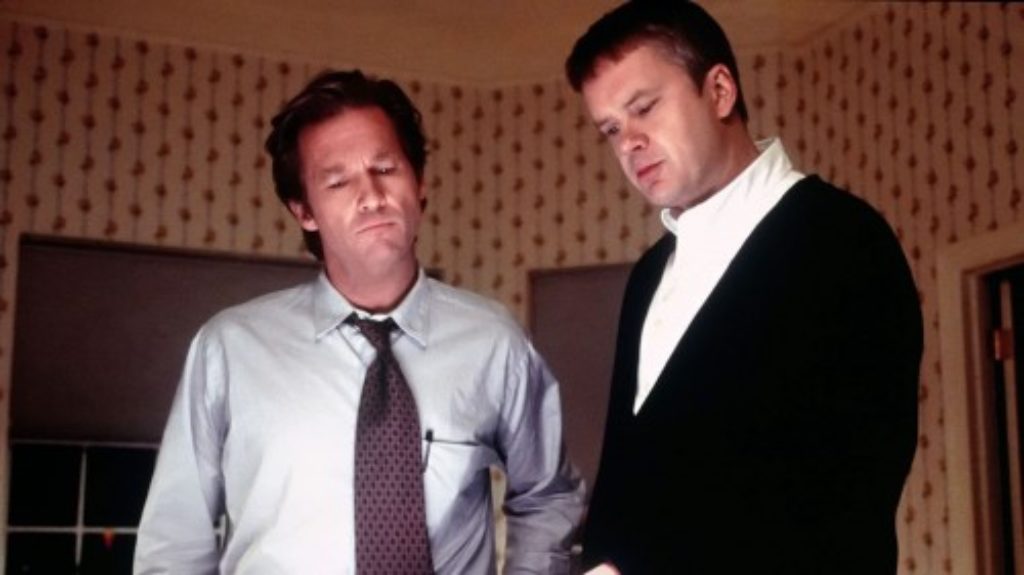
Should it be “love thy neighbor” or “fear thy neighbor”? According to the makers of the psychological thriller Arlington Road, the latter. Especially if those folks across the street are church-going, scout-sponsoring, cardigan-wearing political conservatives. Recent widower Michael Faraday lives with his 9-year-old son in a suburb of Washington, D.C. Following his wife’s tragic and (we learn) preventable death, Michael Faraday copes in part by teaching a college course on terrorism. He believes right-wing extremists are more thoroughly networked and dangerous than anyone in the FBI imagines—that the Timothy McVeys of the world aren’t acting alone. Events unfold that give him reason to suspect that his new neighborhood acquaintances, the Lang family, are up to no good. Oliver Lang is a creepy structural engineer whose coincidental connections to past violence have Faraday intrigued … and more than a little paranoid. But maybe his suspicions are justified. The revelations and heart-pounding action intensify before reaching an unpredictable crescendo. NOTE: Give Sony some credit for delaying the release of this film (originally scheduled for late spring) out of respect for the Columbine tragedy.
Positive Elements: Faraday is a caring father willing to risk life and limb to save not only his son, but a federal building full of potential bombing victims. In the opening scene, he finds a wounded boy staggering in the street and selflessly saves the child’s life by rushing him to the hospital. Adults discuss the importance of family, concluding that it’s up to parents to instill a sense of right and wrong in children, model personal responsibility and promote accountability. Creepiness notwithstanding, the Langs are hospitable and kind to Faraday’s son, and Oliver correctly tells Faraday, “We all need friends. Life isn’t the same without ’em.”
Spiritual Content: Casual mentions of God, faith and attending church come only from the saccharine-sweet Langs, whose religious conservatism seems to be part of their suspicious, extremist views.
Sexual Content: Faraday’s new girlfriend, Brooke, frequently spends the night at his house—in his bed—with sexual activity merely implied.
Violent Content: A boy’s arm is bloodied from a fireworks accident. In a flashback, three people are shot to death when FBI agents storm a farmhouse. Victims of bombings are shown briefly, newsreel style. Faraday and Oliver shove each other and end up in a fistfight. Reckless driving sends pedestrians and motorists diving for safety. While only implied, Brooke meets a violent end when she learns the truth and has her car forced off the road. It is also suggested that Oliver is directly or indirectly responsible for other deaths which occurred years earlier. Oliver threatens to kill Faraday’s son unless he agrees not to contact authorities. A bomb explodes, reportedly killing 184 people.
Crude or Profane Language: One crude reference to sexual intercourse and about 20 profanities. The most egregious are 3 f-words and 8 inappropriate uses of the Lord’s name. (While certainly not excusable, the language is surprisingly restrained compared to other R-rated films and, for that matter, many PG-13 releases.)
Drug and Alcohol Content: Adults drink at a dinner party (no drunkeness).
Other Negative Elements: While drawing attention to the unlawful activities of anarchists, this film seems to vilify the “family values” crowd in the process. It could breed unwarranted paranoia. Statements by the ultraconservative villain such as, “Are you happy in your godless suburban life?” and “There are millions of us waiting to take up arms . . . in war, children die” incongruously combine a belief in God with a militant, homicidal social agenda. There’s also a suggestion that, at age 16, kids do all sorts of bad things (make pipe bombs, steal, have sex, crash cars) that they should not be held responsible for years later.
Summary: This taut psychological thriller is very well made with an explosive ending unlike any in recent memory. For an R-rated head-game, it avoids gratuitous sex, violence and language so often exploited to full effect once film makers realize they’ve stepped beyond a PG-13 label. But there are still too many caveats amid this intense subject matter to earn it a recommendation—not the least of which are the blasphemous uses of God’s name. Families will want to take a detour around Arlington Road.
